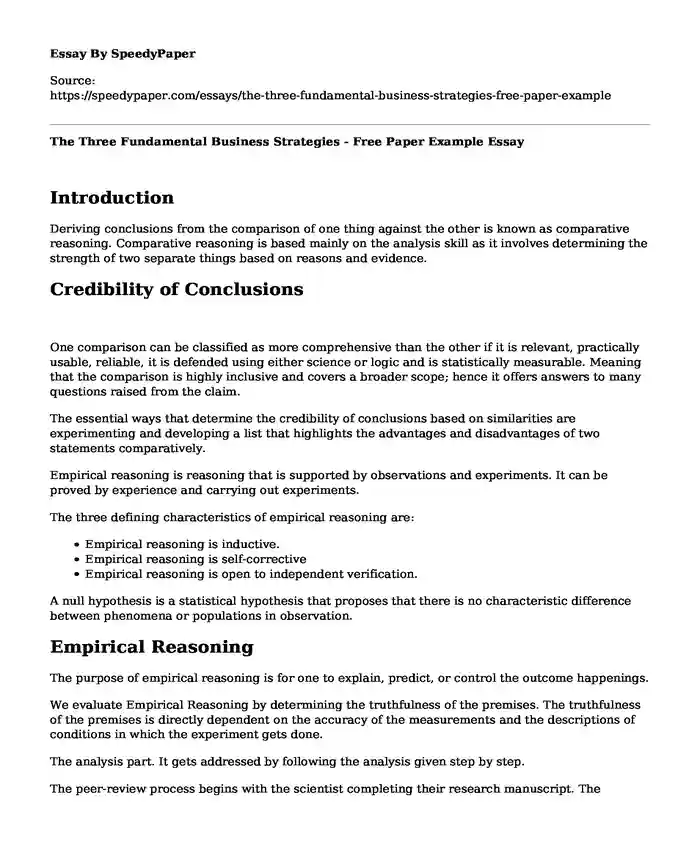
| Type of paper: | Essay |
| Categories: | Students Analysis Business strategy |
| Pages: | 2 |
| Wordcount: | 487 words |
Introduction
Deriving conclusions from the comparison of one thing against the other is known as comparative reasoning. Comparative reasoning is based mainly on the analysis skill as it involves determining the strength of two separate things based on reasons and evidence.
Credibility of Conclusions
One comparison can be classified as more comprehensive than the other if it is relevant, practically usable, reliable, it is defended using either science or logic and is statistically measurable. Meaning that the comparison is highly inclusive and covers a broader scope; hence it offers answers to many questions raised from the claim.
The essential ways that determine the credibility of conclusions based on similarities are experimenting and developing a list that highlights the advantages and disadvantages of two statements comparatively.
Empirical reasoning is reasoning that is supported by observations and experiments. It can be proved by experience and carrying out experiments.
The three defining characteristics of empirical reasoning are:
- Empirical reasoning is inductive.
- Empirical reasoning is self-corrective
- Empirical reasoning is open to independent verification.
A null hypothesis is a statistical hypothesis that proposes that there is no characteristic difference between phenomena or populations in observation.
Empirical Reasoning
The purpose of empirical reasoning is for one to explain, predict, or control the outcome happenings.
We evaluate Empirical Reasoning by determining the truthfulness of the premises. The truthfulness of the premises is directly dependent on the accuracy of the measurements and the descriptions of conditions in which the experiment gets done.
The analysis part. It gets addressed by following the analysis given step by step.
The peer-review process begins with the scientist completing their research manuscript. The researcher then submits their paper to a suitable journal where the editors of the journal review their paper. If the editors feel like the paper met all the requirements and has credible sources, the paper goes through formal peer review done by accomplished researchers in the field. Once the paper passes this stage, it can get published in the journal.
The process of peer review gets designed to motivate authors to meet the accepted high standards of their discipline and to control the distribution of research data by improving the quality of published manuscripts.
Conclusion
In conclusion, it means that taking a critical thinking course causes students to become more skilled at critical thinking and more motivated to use them. The null hypothesis was that growth in critical thinking and taking a course in critical thinking are unrelated. It being false following the research undertaken proves that the first statement is true.
References
Woolley, J. S., Deal, A. M., Green, J., Hathenbruck, F., Kurtz, S. A., Park, T. K. & Jensen, J. L. (2018). Undergraduate students demonstrate common false scientific business strategies. Thinking Skills and Creativity, 27, 101-113.
Zelechowska, D., Zyluk, N., & Urbanski, M. (2020). Find Out A New Method to Study Abductive Reasoning in Empirical Research. International Journal of Qualitative Methods, 19, 1609406920909674.
Cite this page
The Three Fundamental Business Strategies - Free Paper Example. (2023, Nov 07). Retrieved from https://speedypaper.com/essays/the-three-fundamental-business-strategies-free-paper-example
Request Removal
If you are the original author of this essay and no longer wish to have it published on the SpeedyPaper website, please click below to request its removal:
- Is a College Degree Worth It? Education Essay Sample
- Essay Example Focusing on Megamergers
- Free Paper Sample on School Policy
- Curriculum: Differentiating Instruction for Learner Understanding. Essay Sample
- The Zero Tolerance Approach: Essay Sample
- Free Discussion Example: Using Analytical Tools to Achieve Business Outcomes
- The Social Roots of School Shootings - Essay Sample
Popular categories




